
Dentures – Jonesboro, AR
An Easy Way to Restore Your Smile and Confidence
Millions of Americans suffer from tooth loss. If you’re a part of that group, then you know from experience just how much it can affect your quality of life. Not only does it impact your appearance, but the way you bite, chew, and speak as well. Fortunately, you don’t have to let missing teeth affect you anymore. With dentures in Jonesboro, you can enjoy a complete smile once again! If you’re ready to get started, contact our office and schedule a consultation today.
Why Choose Shane Smith DDS for Dentures?
- Custom-Made for Optimal Function and Comfort
- Locally Owned & Operated Dental Office
- State-of-the-Art Technology to Guarantee the Perfect Fit
Who’s a Good Candidate for Dentures?

Whether you’ve lost one tooth or many, there’s a good chance you qualify for dentures. The number of lost teeth doesn’t (or at least shouldn’t) affect your candidacy, so you needn’t worry. Just note that you’ll need to consult our dentists to see if you’re eligible for a denture treatment. Even if you don’t qualify at first, you can become a good candidate later through extra dental work. Please keep reading to learn more, or call us in the coming days!
Effects of Missing Teeth
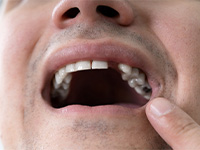
As you consider whether dentures suit you, please review tooth loss’s causes and effects. Going over these basics should help you see what treatment offers.
In general, tooth loss can happen for various reasons. Many cases of teeth falling out stem from severe decay and long-term tooth infections. On the other hand, some people can lose a pearly white or two from gum disease; this condition erodes the tissues supporting your smile. Some unlucky folks will even have a tooth knocked out by a physical accident or injury.
The effects of tooth loss tend to be severe but narrow. For example, missing teeth almost always make crucial everyday tasks – especially eating, speaking, and smiling – much harder. The situation also leads to smile gaps that tilt your remaining teeth and erode your jaw. If those empty spaces are left alone, they’ll also allow harmful oral bacteria to breed and cause oral issues.
What Qualifies You for Dentures?

As stated before, most adults with missing teeth can qualify for dentures; treatment lacks harsh restrictions. Still, you should note three points about candidacy.
Firstly, a patient needs good oral health for dentures to work. The prosthetics only remain stable when the supporting jaw and gum tissues are strong and vibrant. If those body parts are weak and lack density, they won’t keep your dentures in place; your new teeth will slip and fall. That said, sensitive or decayed teeth aren’t disqualifiers; dentures can easily replace them.
Next, how many teeth you’ve lost affects the type of denture you need. Only having a few missing means you’ll get a partial model, which only replaces smaller amounts. Meanwhile, you’ll require a full denture if you need to replace a whole arch of teeth.
The last thing is that your finances also play a role in treatment. After all, dentures are the least costly tooth replacement option; they’re less expensive than dental bridges or dental implants. This restorative option greatly suits those with limited budgets.
Alternative Tooth-Replacement Options
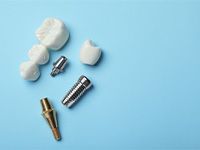
If you don’t qualify for dentures (at least at first), don’t get down. You’re free to consider and try one of our practice’s other tooth replacement options, including:
- Dental Bridges – A dental bridge is a fixed restoration made of two crowns fused to an artificial tooth. To that extent, a dentist must alter your nearby teeth to place and secure them.
- Dental Implants – Unlike dental bridges, dental implants are titanium posts placed in your jaw. They slowly fuse with your jawbone to become secure substitutes for missing teeth. Their design makes them highly effective, but they can be somewhat expensive.
Types of Dentures

Dentures in Jonesboro are an excellent solution for patients suffering from any degree of tooth loss, helping them enjoy a functional and confident smile once again. At your initial denture consultation, you’ll learn more about your available options and recommended treatment plan. In general, there are three types of dentures our team will discuss with you:
Partial Dentures
If you have some healthy teeth remaining, a partial denture may be the ideal option for you. It fits between the teeth to seamlessly close gaps throughout your smile. The gum-colored base and prosthetic teeth are held in place using small metal clasps that loop around the neighboring teeth, completing your grin and restoring a fully functioning bite.
Full Dentures
Full dentures are designed to replace an entire row of teeth at the same time. Like partials, they also have a discreet, gum-colored base and lifelike prosthetic teeth. However, this type of denture sits on top of the gums and is held in place using natural suction or a small amount of denture adhesive.
Implant Dentures
Do you wish to have the sturdy, powerful chewing ability of your natural teeth? If so, you may want to consider implant dentures. Our team will attach a full or partial denture to a small number of dental implant posts that are surgically inserted into the jawbone. This option allows you to enjoy maximum stability and avoid unwanted movement. Additionally, they can last over three decades with proper care and prevent your jawbone from shrinking after tooth loss.
The Benefits of Dentures

Gaps in your smile can make basic daily actions like eating and speaking difficult and uncomfortable, impacting other areas of your life like your health as well. With dentures in Jonesboro, our team can help not only restore your smile, but also give you newfound confidence in the form of a whole and healthy set of teeth. We invite you to read more below about the many benefits awaiting you when you choose to invest in dentures.
Mental & Emotional Health Benefits

Multiple factors can influence the total cost of your denture, but the primary ones are:
Research shows that patients experiencing tooth loss are more likely to experience depression and sadness than those who aren’t missing any teeth. This is because your smile is the first thing that many people notice and integral to how you express joy and happiness. Without it, the mental and emotional weight that you may carry due to a lack of confidence and the impact of the social stigma surrounding tooth loss can have a big effect on your psychological wellbeing. Dentures can transform your smile from one that you feel like hiding into one that you always want to let shine!
Clearer Speech

Your teeth serve many purposes, one of which is giving you the ability to clearly communicate by speaking. With spaces in your arch, you may find it more difficult to sound out certain words, causing you to develop a lisp or stumble during conversation. Whether you opt for full or partial dentures, restoring the spaces in your arch will make it easier to speak by preventing unwanted whistling and even a lisp. Although, it’s important to be patient when you first get your prosthetics, because they can take a little bit to get used to!
More Nutritious Diet

Restoring your teeth with dentures will allow you to enjoy a wider variety of foods, helping you eat more proteins and carbs that you may not have been able to with missing teeth, like chicken, steak, and crusty breads. This will also benefit your long-term health by ensuring you’re able to easily incorporate all of your food groups into your diet.
Preservation of Oral Health
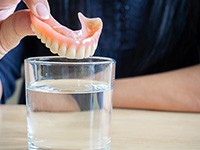
Living with missing teeth has been connected to further tooth loss by a number of studies. Our team at Shane Smith DDS wants you to enjoy a full and healthy smile, which is why we highly recommend restoring lost teeth with dentures or dental implants. This will help minimize your risk of developing additional consequential oral health conditions that can lead to the need for more costly services down the road.
Boosted Confidence

The benefit that keeps on giving when you decide to get dentures is a massive and immediate confidence boost. Going from missing several or all of your teeth to having a whole and healthy smile again can encourage you to get back out in the world and try new things, whether that’s going on a blind date or spending more time with friends and family. This is by far one of the most life-changing and transformative advantages of restoring your smile in Jonesboro.
How Dentures Are Made

Dentures are more than just replacement teeth—they’re precision-crafted dental appliances that can restore your quality of life. At Shane Smith DDS, each step of the denture-making process is tailored to meet the unique needs of each patient. From choosing quality materials to creating custom molds, we ensure every detail is perfected, providing comfortable, natural-looking dentures. Read more below to get a closer look at what goes into the creation of your new smile.
What Are Dentures Made Of?

Modern dentures combine several durable, high-quality materials to achieve a natural appearance and reliable function. Typical mediums might include:
- Acrylic Resin: Used for both the base gums and for teeth, acrylic is lightweight and can be color-matched for a natural appearance.
- Porcelain: Known for its durability and lifelike finish, porcelain is one of the most popular materials used in dentures.
- Flexible Polymers: Used for partial dentures, these materials enhance the comfort and adaptability of your appliance.
So, which materials should you choose? Ultimately, this decision depends on your lifestyle, comfort preferences, and the type of denture. At your consultation, Dr. Smith will guide you through material options, ensuring your dentures feel and look great.
The Denture Creation Process

Creating custom dentures involves several precise steps to ensure they fit comfortably and look natural:
- Initial Consultation: Your treatment begins with a consultation where we assess your oral health and discuss your goals.
- Taking Impressions: Using sophisticated digital technology, we create an impression of your gums and remaining teeth (if any) to serve as the foundation for your prosthetics.
- Dental Lab Send-off: We then send the impressions to a trusted dental lab nearby to let them begin the fabrication process.
- Wax Model Try-In: A wax model of your dentures is crafted and sent to our office. You’ll come back to see us, try the wax model on, check its fit and appearance, and offer suggestions before the model is sent back.
- Final Fabrication: After confirming the wax model, the final dentures are made with durable materials, carefully shaped, and polished for a natural look.
- Fitting Appointment: Once your dentures are ready, you’ll try them on, and any final adjustments are made to maximize comfort.
Every step in this complex process is designed to ensure a perfect fit, giving you the confidence to speak, chew, and smile with ease!
Adjusting to Your New Dentures

Getting used to new dentures may take a little time, but we’ll be here to guide you every step of the way. Here are some tips to help you adjust faster:
- Practice Speaking: Read aloud often to help your mouth adapt to the feel of your dentures.
- Start with Softer Foods: This makes chewing easier until you get accustomed to your new bite.
- Use Denture Adhesive: If needed, adhesive can help keep your dentures in place while you gain the skill and muscle control needed to keep them sturdy.
- Stay Positive and Patient: Some patients adjust faster than others, but persistence matters, so don’t get discouraged if it takes a few weeks.
Dentures Aftercare

Dentures can completely restore your smile’s looks and functionality – but that doesn’t mean you can neglect your oral care! You’ll need to continue attending your biannual preventive checkups; we’ll be able to monitor your oral health and ensure that your dentures remain problem-free. You’ll also want to adopt a diligent hygiene regimen to make sure that your mouth remains a healthy and suitable environment for your new dentures. Here’s a breakdown of everything you’ll need to know concerning dentures aftercare, and if you have any questions, don’t hesitate to contact our office for assistance!
Removable Dentures
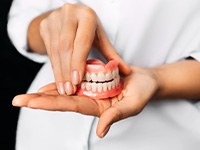
Remove After Eating
After every meal, you will need to remove your dentures to rinse them off. This helps to prevent food debris and bacteria from building up and causing plaque – and although your dentures cannot get cavities, the rest of your mouth is still susceptible to problems. Keep in mind that you should never rinse your dentures with hot water, as the heat can warp the denture material and cause them to not fit properly.
Clean Your Restoration
You won’t be able to thoroughly clean your dentures until you’ve removed them from your mouth. You can use a soft-bristled toothbrush and a small amount of unscented hand soap, dish soap, or denture cleanser to gently brush them. Don’t use regular toothpaste or any type of abrasive products, as this could harm your restoration. If you aren’t going to be wearing the dentures again right away, place them in a container of water to keep them moist. Remember to always rinse your dentures off again after cleaning them, to avoid getting the cleaning materials in your mouth.
Keep Your Dentures Safe
When you’re cleaning your dentures, we recommend placing a towel underneath the area where you’re working so that in case the restoration accidentally falls, it’s less likely to become damaged. Be sure that when you’re handling your dentures, you’re doing so carefully and keeping them away from young children, pets, or anything else that could accidentally cause harm to them. If something does happen and your dentures become broken, don’t hesitate to contact our office at home – do not try to repair them yourself.
Remove Your Dentures When You Sleep
Your dentures are designed to feel incredibly lifelike and comfortable, but this doesn’t mean you should leave them in while you’re sleeping. Wearing dentures for too long can restrict the circulation in your gums, leading to soft tissue irritation, not to mention, it’s been linked to an increased risk for conditions like gum and tongue plaque, and even pneumonia. Taking your dentures out at night is also the perfect opportunity to soak them in a cleansing solution, keeping them clean and in ideal condition.
Notice Changes
You should regularly inspect your dentures for signs of wear and tear or other forms of damage so that you can promptly have them corrected. Remember, if your dentures become damaged, you shouldn’t try to fix them on your own, as this might cause further damage to the restoration – or to your smile. If your dentures are shifting, clicking, or showing other signs of not fitting properly, you might need to have them relined or fully replaced, and our team is happy to help with this!
All-on-4 Dentures
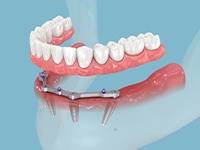
All-on-4 differs from traditional ones in the sense that they aren’t removable, meaning that you’ll need to care for them a little differently. However, this care isn’t complex at all and greatly echoes how you’d care for your original teeth. You’ll need to brush twice a day using a soft-bristled toothbrush, avoiding any abrasive oral hygiene products. Also, ensure that you’re flossing each day; floss threaders are available if traditional strands are too difficult to manage. Finally, be sure you’re rinsing your mouth regularly with antibacterial mouthwash to prevent the growth of tartar.
Understanding the Cost of Dentures

As with most types of dental work, the cost of dentures is almost never the exact same from one patient to another. Because so many variables come into play, we can’t give you an accurate cost estimate unless and until you come into our office for a consultation. At that point, Dr. Smith can review the factors affecting how much your new teeth will cost as well as your options for making your denture affordable.
Factors That Affect the Cost of Dentures

Multiple factors can influence the total cost of your denture, but the primary ones are:
- Any preparatory procedures you need (gum disease therapy, tooth extractions, etc.)
- The number of teeth you’re replacing
- Whether you’re anchoring your denture onto dental implants
- The materials your prosthetic will be made from
Keep in mind that cheaper dentures aren’t necessarily the best option. In fact, cheap dentures tend to break down more quickly and be less comfortable than dentures made from durable materials, like the ones we provide here at Shane Smith DDS. For something you’re going to use every single day as you speak, eat, and smile, it’s worth investing in a high-quality solution.
Are Implant Dentures More Expensive?

Since implant dentures require multiple dental implants and oral surgery, they almost always cost more than traditional dentures, but for good reason. While a regular denture will need to be replaced every five to seven years, an implant denture can last for several decades, making it a smarter investment in the long term. Plus, implant dentures reliably stay in place without adhesive, and they restore much more chewing power. Together, these factors make implant dentures worth every penny!
Does Dental Insurance Cover Dentures?

More often than not, dental insurance providers will cover about 50% of the cost of dentures, as they’re considered a major restorative treatment. Of course, this varies from plan to plan. Our practice is in-network with most of the major dental insurance plans, including BlueCross BlueShield and Delta Dental, but we’ll also file claims on your behalf even if your plan is out-of-network.
Other Options for Making Dentures Affordable

If your insurance doesn’t provide sufficient coverage, or if you don’t have insurance at all, then we can make dentures affordable by signing you up for a low- to no-interest payment plan through CareCredit. This financing option lets qualified patients split up the costs of their dental treatments into budget-friendly monthly installments.
The best way to know for sure how much your dentures will cost is to schedule a consultation at our office. Our team is always happy to answer your questions and help you feel confident that you’re making the right choice for your smile.
Denture FAQs

Getting dentures can make a massive difference in your day to day life, usually for the best. However, any kind of change like that can be intimidating, and you may naturally have serious questions about what you can expect from your new prosthetic.
We get all kinds of questions from our patients, and we’ll be happy to discuss with you anything you may be curious about. Here are just a few examples of things people often want to know about getting a prosthetic.
Can I Sleep with My Dentures?
We strongly recommend that you refrain from wearing your dentures to bed. Dentures naturally restrict circulation in the gums, which means that for your oral health it’s important to take them out regularly. Moreover, bacteria can start to develop under your prosthetic if you never take them out. Taking them out to soak in a denture cleaning solution is a good way to not only air out your gums, but to keep dentures from developing bacteria.
Will It Hurt to Get Dentures?
When you first get your dentures, you’re likely to experience disproportionate sore spots and discomfort while your mouth adjusts to your new prosthetic. The amount of time that this will take varies, and it may be a few months before your dentures really feel “right” in your mouth, but you should gradually feel more comfortable as time goes on.
If you find that pain persists or gets worse, you should give us a call so that we can make sure that you aren’t dealing with any substantial problems.
Is It Hard to Talk with Dentures?
In the long run, you shouldn’t have any problem talking while wearing your dentures. However, it’s a skill just like anything else, and it will take some time to master it.
When you first get your prosthetic, make an effort to speak slowly and clearly. You may have to find a bit of time to actively practice talking, either by reading aloud or having a conversation with a friend. Make note of words that give you trouble and pay special attention to pronouncing them correctly. Keep this in mind and you should be back to speaking normally in no time.
As a note, denture adhesive can be especially useful in these first few weeks while you adjust. However, you should avoid overusing adhesive, as this may mask underlying issues with the fit of your dentures.
What Can’t You Eat with Dentures?
While your dentures can allow you to eat more easily than you can without them, there are some foods that you should still probably avoid. For one, sticky foods like peanut butter can potentially pull your dentures out of place, as can gummy candies. Then there are foods that can splinter into pieces, like nuts and popcorn. Small shards of these foods can get under your prosthetic and irritate your gums.
Finally, there are foods that you can eat on occasion but require some additional caution. Tough foods like red meat and crunchy vegetables can put a lot of pressure on your gums, so be sure to cut them into small bite-sized pieces before you eat them.